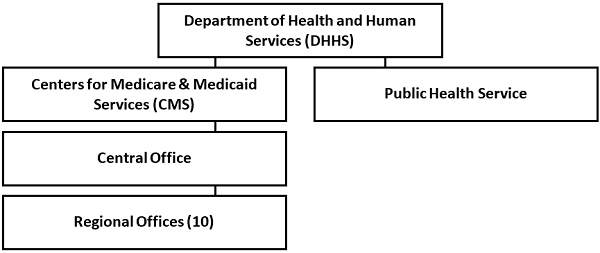-
Section 1 Introduction
- Introduction
- Federal Government Administration
- Fundamentals of Medicare: State Responsibilities
- Fundamentals of Medicare: Participating Providers
- Voluntary and Involuntary Termination of Provider Agreement
- Disclosure of Health Insurance Information
- Privacy Act
- National Provider Identifier
- Legacy Provider Numbers/Provider Transaction Access Numbers (PTANs)
- Medicare Administrative Contractors
- Fundamentals of Medicare: Information References
- Acronyms
- Fundamentals of Medicare: Glossary of Terms
-
Section 2 Medicare Basics
- The History of Medicare
- What Is the Medicare Program and How Is It Funded?
- Medicare Eligibility and Premiums
- The Social Security Administration and Medicare Enrollment
- The Medicare Card
- Medicare Part A
- Inpatient Hospital Care
- Skilled Nursing Facility Inpatient Care
- Home Health Care Benefit
- The Hospice Benefit
- Medicare Part B Medical Insurance
- Fundamentals of Medicare - Medicare Program Exclusions
- Medicare Advantage Organizations
- Medicare Secondary Payer
- Supplemental Insurance
- Coordination of Benefits Trading Partners
- Section 3 Fraud and Abuse
- Section 4 Getting Ready to Bill Medicare
Section 1: Introduction
Table of Contents
Federal Government Administration
The U.S. Department of Health and Human Services has overall responsibility for administering the hospital insurance and voluntary SMI programs. Two major agencies – CMS and the Public Health Service – are involved in specified administrative functions.
Who Is CMS?
CMS develops policies and oversees the Medicare and Medicaid programs - two national health care programs that benefit about 75 million Americans. Along with the Health Resources and Services Administration, CMS also oversees the SCHIP, a program covering many of the approximately ten million uninsured children in the United States.
CMS' Goals
- Protect and improve beneficiary health and satisfaction
- Foster appropriate and predictable payments and high quality care
- Promote understanding of CMS programs among beneficiaries, the health care community and the public
- Promote the fiscal integrity of CMS programs and be an accountable steward of public funds
- Foster excellence in the design and administration of CMS programs
- Provide leadership in the broader health care marketplace to improve health
Program Objectives
Access to Quality Care
- Expand health care choices and further strengthen programs and services to adapt to beneficiary needs
- Improve quality of care and health outcomes for the beneficiaries of CMS programs
- Improve access to services for underserved and vulnerable beneficiary populations, including eliminating health disparities
- Protect beneficiaries from substandard or unnecessary care
Services to Beneficiaries
- Improve beneficiary satisfaction with programs, services and care
- Strengthen communications with Medicare beneficiaries, caregivers, partners and stakeholders to enhance the information provided to beneficiaries
- Strengthen communications with states, territories, tribal governments and other partners and stakeholders to enhance the information provided to Medicaid and SCHIP beneficiaries
- Strengthen beneficiary program protections and improve communications with State Departments of Insurance to enhance the information provided to individuals regarding their health insurance rights
Program Administration
- Promote the fiscal soundness of CMS programs
- Modernize and effectively manage s information systems and technology
- Improve Medicare contractor management
- Design and maintain payment processes that pay claims only for covered, medically necessary services, at correct payment amounts and in a timely manner
- Strengthen program safeguards
- Develop and refine payment systems to foster efficiency, promote innovative service delivery and appropriate utilization, and ensure access to care for beneficiaries
CMS Structure
CMS is organized into three Centers, each of which has a different focus.
The Center for Medicare Management focuses on management of the traditional Fee-for-Service Medicare Program. This includes development of payment policy and management of the Medicare Fee-for-Service contractors.
The Center for Beneficiary Choices focuses on providing beneficiaries with information on Medicare, MAO and Medigap options. It also includes management of the MAO, consumer research and demonstrations and grievance and appeals functions.
The Center for Medicaid and State Operations focuses on programs administered by states. This includes Medicaid, the SCHIP, insurance regulation functions, survey and certification and CLIA.
CMS Central and Regional Offices
Under the Center for Medicare Management, CMS has central and regional offices that are responsible for the general management and operation of all the programs CMS oversees. CMS’s central office is located in Baltimore, MD. Reporting to the central office there are ten regional offices, listed below. Each program contractor reports to a specific regional office and the central office.
| CMS Central and Regional Offices |
|---|
| Atlanta, GA |
| Chicago, IL |
| Denver, CO |
| New York, NY |
| San Francisco, CA |
| Boston, MA |
| Dallas, TX |
| Kansas City, MO |
| Philadelphia, PA |
| Seattle, WA |
Who Is the Public Health Service?
The Public Health Service is responsible for administering the professional health aspects of the programs CMS oversees. In brief, their responsibilities include the following:
- Consulting and recommending to CMS matters concerning the development of health and safety standards and other guidelines needed for determining whether providers of services meet the conditions of participation under the program
- Consulting and advising state agencies concerning the application of standards for providers
- Coordinating programs and activities necessary to study the utilization of services under the programs

Reviewed 6/4/2024